Settlers Destroy 2,000+ Palestinian-owned Trees and Vines, Backed by Israeli Authorities
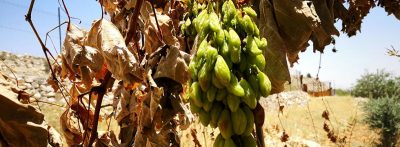
Note to readers: please click the share buttons above
In just over two months, from the beginning of May to 7 July 2018, B’Tselem documented 10 instances in which settlers destroyed a total of more than 2,000 trees and grapevines and burned down a barley field and bales of hay. In some places, the settlers left behind them graffiti slogans in Hebrew, reading “No to farmer terrorism” and “”There’s not place we won’t reach”. Some of the farmers had already suffered settler violence in recent years.
While this high incidence of the assaults is unusual, the phenomenon itself has long since become routine in the West Bank. Settler violence and vandalism takes place with full backing by the Israeli authorities. Sometimes soldiers take part in the assault; at other times, they stand idly by. The police makes no substantial effort to investigate the incidents, nor takes measures to prevent them or stop them in real time.
Israel benefits from the repercussions, as settler violence has gradually dispossessed Palestinians of more and more areas in the West Bank, paving the way for a state takeover of land and resources. This occurs because Palestinians avoid entering areas in which they have been attacked, usually close to settlements. As a result, extensive Palestinian farmland near settlements has been vandalized and neglected to such an extent that it yields poor crops, making it not worthwhile for the owners to risk their safety to get there. This process has essentially erected invisible walls throughout the West Bank, which Palestinians know crossing will expose them to violence and even danger to their lives.
Some of the testimonies given to B’Tselem field researchers from the landowners whose property was vandalized follow.
Hebron area
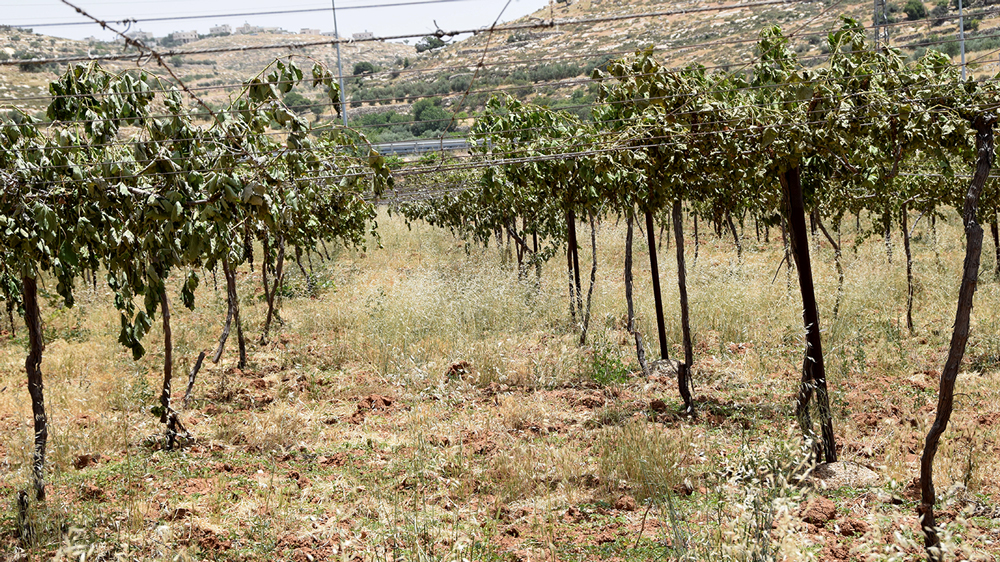
Vines whose trunks were sawed off in the abu rajab brothers’ vineyard in the south hebron hills. Photo by Muhammad Abu Rajab, 27
South Hebron Hills, 26 May 2018, approx. 700 grapevines cut down:
Muhammad Abu Rajab, 63, a resident of Hebron, is married and has three children. Along with his three siblings, he owns two vineyards with a total of about 700 grapevines in the area of al-Ballutah, south of the town of Yatta. In a testimony he gave B’Tselem field researcher Musa Abu Hashhash on 27 May 2018, he related how he discovered the vines had been cut down:
We jointly own about 700 grapevines in two vineyards that we planted some seven years ago. Last year they yielded seven tons of grapes, which earned us about 100,000 shekels (USD 27,224) altogether. This year we were supposed to harvest double that. My brothers and I tended the land and cultivated it over the years. We plowed it and planted the vines. We were very happy. We go to the vineyards almost every day to tend to the vines, and that’s how we make a living.
On Thursday, 24 May 2018, I sprayed the vines and everything was normal. The next day I didn’t go because of Ramadan Friday prayers. On Saturday, the neighbors called me and said something looked off about the vines, and that they thought something had happened to them. I went to the land and was shocked at the sight. All the vines in both vineyards had been chopped down. I couldn’t believe my eyes. I thought, who could have done such a thing to the vines, which never harmed a soul? In a shed between the two vineyards, where we rest sometimes, I saw Hebrew graffiti sprayed on the floor. Later, someone told me they said “No to farmer terrorism” and “We’ll get you everywhere”. From the state of the vines, it looked like they’d been cut down with a power saw. Sawing off 700 vines takes a lot of time, and it’s an area where police cars and army patrols pass by once in a while. I guess the settlers weren’t afraid of them at all.
After I came to my senses, I called my brothers and told them what had happened. They immediately called the Palestinian DCO and came to the land. The DCO called the Israel Police, and police officers and forensic experts arrived. They took my testimony and I noticed that they found a mobile phone. Maybe it belonged to one of the offenders.
The losses we incurred from the damage to the vines can’t be measured in numbers. We invested seven years of work in those vineyards. Every grapevine cost us hundreds of shekels, in my estimation, by the time it grew and bore fruit. It’s also impossible to quantify the hours we put in and how tiring the work was. We cared for those vines like we care for our own children, and it all went down the drain in one moment. Now we’ll have to uproot the remaining trunks, which will be very costly, and plant new seedlings – although we have no guarantee they’ll be safe now.
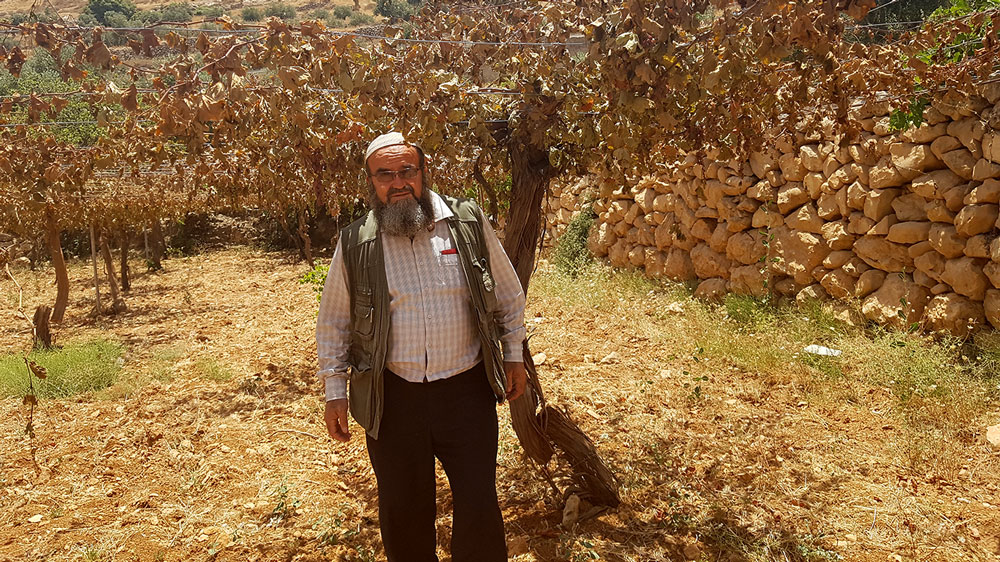
‘Issa Idris next to a severed vine in his vineyard in Hebron. Photo by Manal Al-ja’bri, B’tselem, 18 June 2018
Hebron, 25 June 2018, 82 grapevines cut down:
‘Issa Idris, 60, a resident of the Jaber neighborhood in Hebron, is married and has seven children. The family owns a third of a hectare in the area of Khalet a-Natsheh, which Idris cultivates with his brothers and sisters. The settlement of Qiryat Arba was established north of the plot. In a testimony he gave B’Tselem field researcher Musa Abu Hashhash on 28 June 2018, Idris described the damage incurred by the destruction of 82 grapevines on the family land:
I’ve been growing grapes with my brothers and sisters on our family land for 35 years. Last Monday, 25 June 2018, my cousin called me and told me the vines in our vineyard had been cut down. I couldn’t go there immediately because I was at work. My siblings were also at work and couldn’t make it. I got to the land only around seven in the evening. I counted 82 vines that had been chopped down. From the look of them, they were cut with a power saw. The vineyard is about twenty meters off Route 60, where soldiers patrol all the time. There are also cameras nearby belonging to Qiryat Arba, and they cover the area of the vineyard.
We lost our entire crop for the year. That’s tens of thousands of shekels lost. But it’s more than that – it’s years upon years of tending the trees and caring for them down the drain. Now we’ll have to invest money in uprooting the trunks, preparing the soil and replanting the vines. But I don’t know, maybe we won’t replant because the police and army offer no protection. They can do this to us again. In 2010, settlers damaged dozens of trees on another of our plots. We filed a complaint but no one did anything about it. This time I didn’t file a complaint, because I don’t think there’s any point.
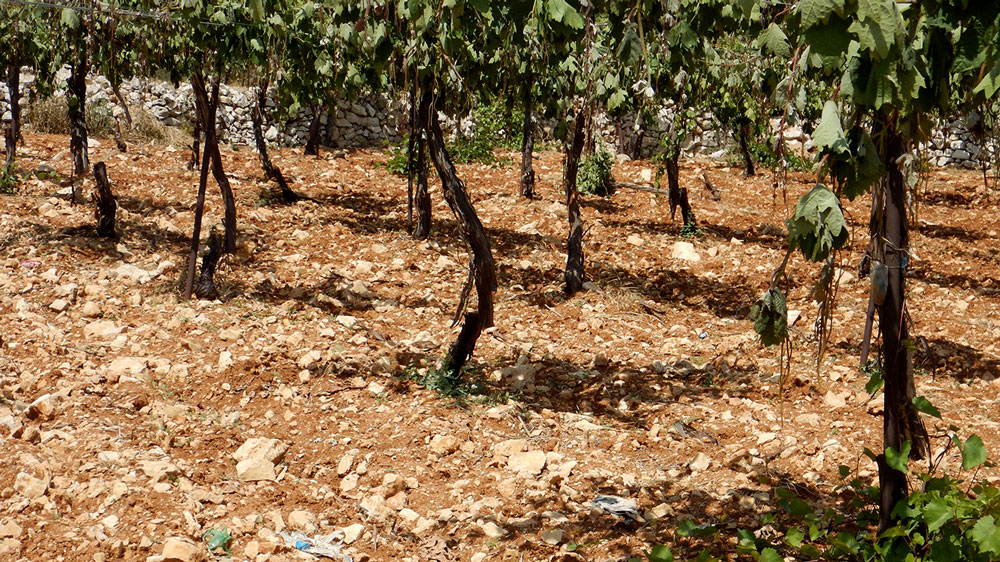
Severed vines in Haitham Jahshan’s vineyard in Halhul. Photo by Musa Abu Hashhash, B’tselem, 16 May 2018
Halhul, May 2018, approx. 880 grapevines cut down:
Throughout the month of May, some 880 grapevines were cut down in five different plots in the area of Halhul. The testimonies of two of the landowners follow:
Halhul, 16 May 2018, 400 vines cut down:
Haitham Jahshan, 42, is a resident of Halhul and a married father of four. He and his uncles own a 2.9-hectare plot by Route 60. There is a military watchtower directly overlooking the plot. In a testimony he gave B’Tselem field researcher Musa Abu Hashhash on 16 May 2018, Jahshan related:
Most of the trees on our land were planted more than fifteen years ago. This morning at six o’clock, my uncles and I went there to continue spraying the soil, which we began yesterday. When we got there, we were shocked to see all the grapevines destroyed in four vineyards, which cover half a hectare. There were almost 400 fruit-bearing vines there. From what I could see, they were sawed off with a power saw at about 40-50 centimeters above ground. You can’t begin to comprehend what a disaster it is. They didn’t leave a single vine standing in all four vineyards. On one rock we found a slogan in Hebrew that said “We’ll reach every spot”. That’s how we understood that settlers were behind this.
There’s a military watchtower opposite the plot, manned by soldiers. I guess the settlers weren’t afraid of them. There are also military security cameras nearby, and they may have captured what happened.
We went to the Palestinian DCO, and they notified the Israel Police. Israeli police officers came the next morning at nine and took photos of the chopped vines, and then I went and filed a complaint at the Qiryat Arba police station.
We lost more than 50,000 shekels (USD 13,600), but it’s about more than money. We’re deeply attached to those vines. We grew and tended them with joy and happiness for years until they bore fruit.
Halhul, 22 May 2018, 180 grapevines cut down:
Maher Karajah, 49, is a resident of Halhul and married father of five. He owns a quarter of a hectare on which he grew 180 grapevines. On 22 May 2018, at 8:00 A.M., he arrived at the vineyard as usual and found it entirely destroyed. In a testimony he gave B’Tselem field researcher Musa Abu Hashhash on 24 May 2018, he detailed the repercussions:
I lost the season’s entire crop of grapes and vine leaves. I still can’t fully grasp the extent of this sudden blow. I’m in shock. I spent my youth in this vineyard. It’s part of my life and my family’s life. We cared for those vines as though they were our children. My father left me this land.
Now I have to uproot the vines, clean up the land and plant new ones. It will cost a lot of money and take a lot of work. I’ll have to bring in a bulldozer to remove all the trunks and trellises that were holding up the vines. It will take at least five or six years for the new vines to bear fruit, and they’ll yield a smaller crop than the ones we had. But I have no choice. It was my main source of income. To be honest, I feel like I lost one of my children, and I’m not exaggerating.
Bethlehem Area
Al-Khader, early July 2018, 168 grapevines cut down:
Hassan ‘Issa, 70, is a married father of eight who lives in the village of al-Khader. He owns almost half a hectare (0.45) off Route 60. The settlement of Elazar was established opposite his plot. On 7 July 2018, after not working the land for several days, he discovered that 168 of his 250 grapevines had been cut down. In a testimony he gave B’Tselem field researcher Musa Abu Hashhash on 9 July 2018, ‘Issa described what happened:
During the month of Ramadan I worked the land every day, weeding, plowing, spraying and checking the grapevines. I’m in love with the earth and with my trees, and care for them the way I care for myself and for my children. Last Saturday afternoon I was next to a mosque close to my house when Abu Jbarah, who owns land next to mine, came up to me. He said he’d seen that my vines had been cut down. I couldn’t believe what I was hearing. I ran home and asked my son ‘Omar to drive me to the land in his car. When I got there, I saw the leaves all dry and collapsed. I sat down on the ground and burst out crying like a little boy. My son walked among the vines checking them, and then he drove me home because I couldn’t stand the sight.
When we got there, the DCO called ‘Omar and told us to go back to the land because people from the Civil Administration and police officers were about to arrive. I guess Abu Jbarah, who told me the vines had been cut down, let the DCO know, too. We went back and saw that the police had already started examining the trees and taking photos of them. They told me to go to the police station in the settlement of Betar Illit and file a complaint. The next day, Sunday, I went there. The officers had counted the vines that were cut and told me there were 168 of them. I’ve heard of similar incidents in our area.
Despite what happened, I’ll continue working the land. I’ll remove the severed trunks and plant new vines. That means I’ll have to wait several years until they bear fruit – if the settlers don’t destroy them too. It’s hard to protect my land because it’s far from my house. The army, the police and the Civil Administration are the ones that should be protecting it. My vineyard is right by Route 60, where there are frequent patrols. What happened to my vines feels like a terrible injustice, and I feel incredibly frustrated and deeply sad.
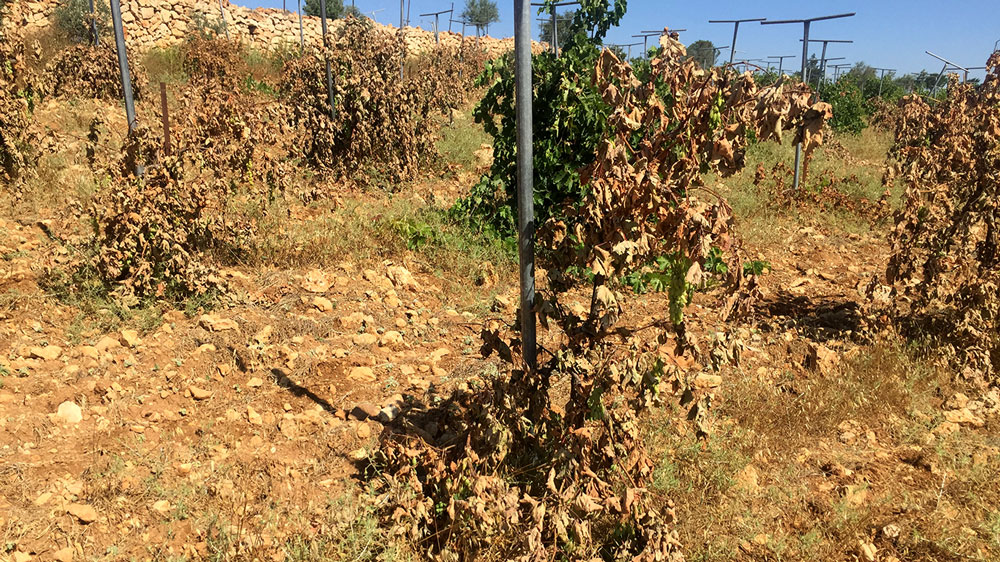
Destroyed vines in Islam Jaber’s vineyard in Al-khader. Photo by Musa Abu Hashhash, B’tselem 5 July 2018
Al-Khader, 5 July 2018, 170 grapevines cut down:
Islam Jaber, 70, is a married father of four who lives in the village of al-Khader and works part-time at a computer store. He also owns 0.8 of a hectare off Route 60 near which the settlement of Neve Daniel was established. Jaber planted about 800 grapevines, olive trees and fig trees on his land. This is what he related in a testimony he gave B’Tselem field researcher Musa Abu Hashhash on 9 July 2018:
In 2010, we invested about 200,000 shekels (USD 54,407) in our land to enhance the soil, and then we planted grapevines. Three years later they bore fruit and since then, every season they yielded seven to eight tons of grapes. We made an average of about 30,000 shekels (USD 8,161) a year. We cultivated the trees and the land – plowing, pruning and fertilizing – until they became our family’s main source of income. In the last few days we worked all day in the vineyard, preparing for the coming harvest. My mother picked vine leaves to sell almost every day. The last time I was at the vineyard was 1 July 2018. I felt delighted when I saw the clusters of grapes on the vines.
On 5 July, at about 5:30 in the morning, my mother went to pick leaves and noticed that some of the vines looked wilted. She checked closely and discovered they’d been cut. She called me at 6:00 and I came immediately. I was shocked when I saw what had been done to the vines. They were chopped off at the bottom and the leaves were wilted. It was very painful to see the clusters of grapes all dry. I called the Israel Police, the Civil Administration and the Palestinian DCO. About half an hour later, police, soldiers and Civil Administration people arrived. The police took photos and counted 170 chopped vines. They also found slogans on the cover of the well and on a plastic board reading “No to farmer terrorism” and “Revenge”. They collected tissue paper that was lying on the ground and took photos of shoe prints. They asked me to come give my testimony at the Betar Illit police station, and I did.
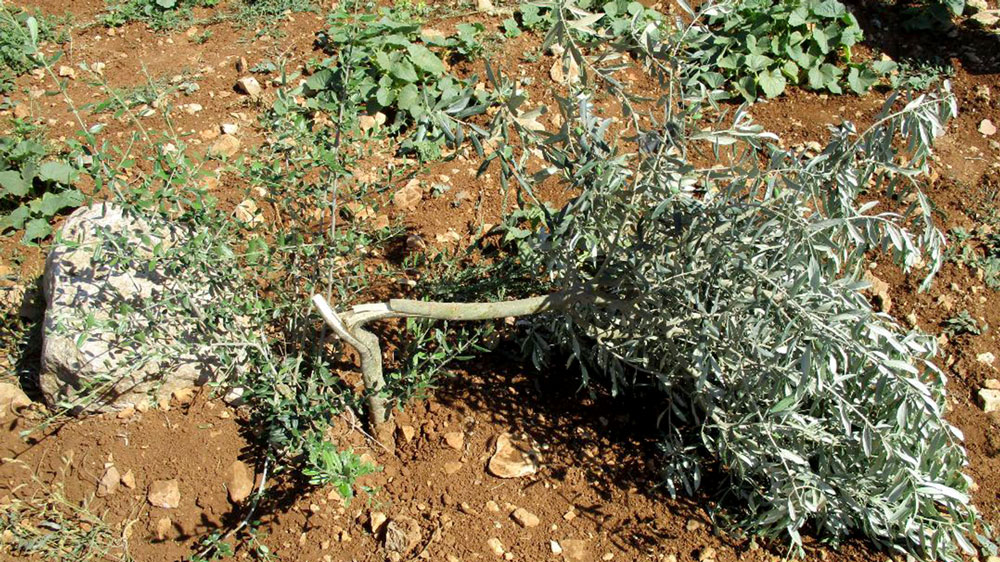
A severed olive sapling in Rabah Hazmah’s orchard in Turmusaya. Photo by Iyad Hadad, B’tselem, 10 June 2018
The Ramallah area
Turmusaya, 9 June 2018, some 130 olive trees broken:
Rabah Hazmah, 21, is married and lives in the village of Turmusaya, near Ramallah. He owns about one and a half hectares east of the village. The settlement of Adei Ad was established about half a kilometer south of there. In 2014 and 2015, settlers vandalized hundreds of Hazmah’s trees in several incidents. Today, there are more than 300 olive trees in his grove. On 9 June 2018, settlers broke the branches on approximately 100 of his trees, and on some 30 other trees in nearby groves. Hazmah described what happened in a testimony he gave B’Tselem field researcher Iyad Hadad on 10 June 2018:
Yesterday – Saturday, 9 June – I went to my land. A relative of mine, ‘Azmi al-‘Araj, also came in his car. About 200 meters away we saw a group of about ten settlers breaking the olive trees. They were wearing black and white clothes and some had a yarmulka (kippa). We couldn’t see their faces from afar. We immediately stopped the cars and started walking towards them and shouting, in the hope that they would see us and run off. Instead, they ran towards us with stones. We ran back to the cars.
I immediately called Husam, who works at the Israeli DCO. He gave me his number after the last time I was attacked, in May 2015. Husam told me he’d come himself, and that he’d also notify the police. Then I called people from the village to come help me. The settlers kept on breaking branches and took no notice of us. Every now and then we tried to come close but they ran towards us, we fled, they went back to breaking the trees, and so on. They destroyed the trees with no compassion and no mercy. I felt like they were breaking my ribs.
About twenty minutes later, Husam arrived with some soldiers and police officers. Only then did the settlers stop and move away, but they stayed on my land. Husam, the soldiers and the police officers saw them but did nothing to them and didn’t even go up to them.It was only after they arrived that I dared to go over to the trees to see what happened. At that stage, some people from the village also arrived. The soldiers and police officers were with me. I saw that about 100 of my trees had been broken, and about 30 trees in neighboring plots. The police officers took photos of the trees and one of them took my testimony. They told me to file a complaint at the Binyamin Region police station.
This isn’t the first time settlers have attacked our trees and land. It’s happened dozens of times and the villagers have filed dozens of complaints with the police, but there has never been a serious investigation and no settler has ever been arrested or punished. We also never received compensation. I can’t estimate the financial damage yet. Some trees die after their branches are snapped off, but sometimes they can be saved.
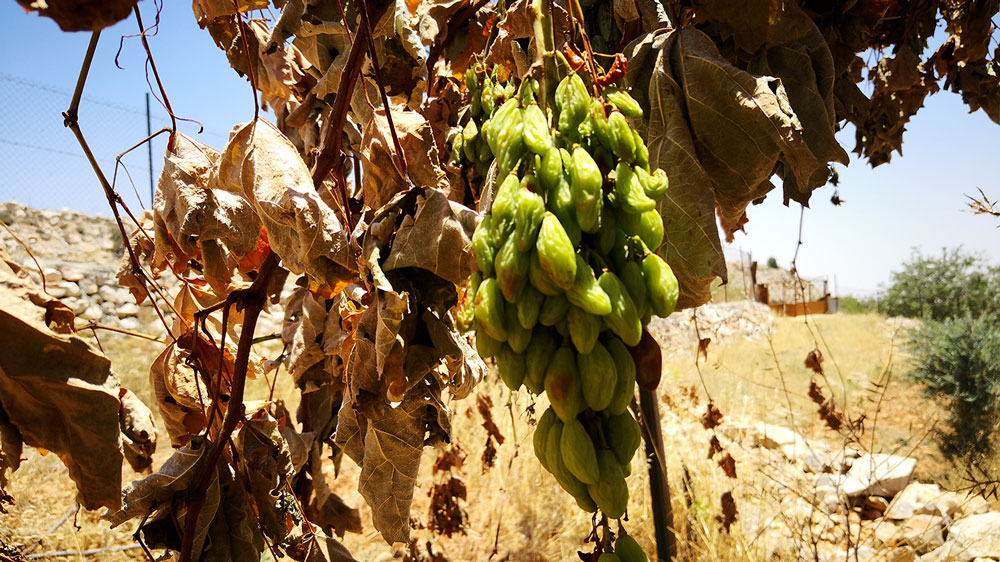
A cut vine in Nizam Ma’tan’s vineyard in Burqa. Photo by Iyad Hadad, 26 June 2018
Burqa, 25 June 2018, 48 grapevines and trees cut down
Nizam Ma’tan, 45, is a married father of seven and lives in the village of Burqa. He owns a third of a hectare about a kilometer from his house, and planted grapevines, olive trees and almond trees on the land. Over the years, Mu’tan has suffered many attacks by settlers. Most recently, in April , settlers assaulted him and his son and killed one of his sheep.
On 25 June 2018, Ma’tan discovered that settlers had chopped down 48 of his trees: 30 grapevines, 11 fig trees and seven almond trees. They also sprayed graffiti reading “No to farmer terrorism” and “We’ll reach every spot”. In a testimony he gave B’Tselem field researcher Iyad Hadad on 26 June 2018, he related:
I don’t feel like going to my land anymore. I’m frustrated and filled with despair from filing so many complaints with the police. The complaints go nowhere. They either chop down trees or burn cars or attack us or kill our sheep. They are free to attack and kill without paying a price. I don’t believe they will let us be and I don’t believe they’ll be punished.
Every one of the trees they cut down was like one of my children. I cared for them, watered them, plowed the land, pruned the branches, fertilized the earth, removed weeds, and they slowly grew – just like my sons Muhammad and ‘Omar. Suddenly, I lost them. I have no words to describe how awful it feels. You can only understand if you’ve been through it yourself.
It’s especially hard because this isn’t the first time. This has been going on for years. Every time I manage to plant trees instead of the ones they destroyed, and the trees grow, they come and destroy everything again. There is no one to help and protect us. We’ve done everything we can to prevent it except resort to violence. I’m not a violent man and all I want is to make sure my children have a safe and peaceful future.
Deir Jarir, 27 June 2018, barley field burned down:
On Wednesday, 27 June 2018, settlers torched a 10-hectare barley field in the area of Deir Jarir. The field was cultivated by Muhammad Ka’abneh, 48, a married father of nine who leased the field from a family in the village. In a testimony he gave B’Tselem field researcher Iyad Hadad on 28 June 2018, Ka’abneh related:
Last night, at around nine, we saw that our field was going up in flames. I went there with my brothers and sons and other residents of the village, and we saw two settlers passing by near the field. We called the Palestinian fire brigade and DCO, and meanwhile started putting out the fire with dirt and stones. About twenty minutes later, a fire truck came and the firemen put out the remaining fires.
Then the Israeli DCO people arrived with soldiers and police officers. They did nothing. One of the officers walked around the area and saw there were also 15 broken olive trees in a nearby grove that belongs to another family. The officer who took photos of the damage caused by the fire claimed that it had occurred two or three days earlier and that there was nothing they could do about it. I said: “Can’t you see there’s still smoke rising from the earth?” He paid no attention and just told me to go to the Binyamin police station to file a complaint. If an officer who’s there on the ground doesn’t want to listen to us, it’s a waste of time to go to a police station and file a complaint.
The fire caused huge damage, especially because we were days away from the harvest. Now we have to buy animal feed for 50,000 or 60,000 shekels (USD 13,600-16,300). We may have to sell some of the flock or take out a loan to pay for the feed, because obviously we’re not going to get any compensation. All we can do is pray.
Kafr Malek, 28 May 2018, 60 grapevines cut down:
On 28 May 2018, settlers cut down about 60 out of more than 100 grapevines in the vineyard of Iyad ‘Issa, 46, a married father of three and teacher from Kafr Malek, east of the village. The settlers sprayed the slogan “Regards from Esh Kodesh” on a nearby rock. See ‘Issa’s testimony in the above video.
The Nablus area:
Burin, 23 June 2018, 150 olive trees burned down:
On Saturday, 23 June 2018, settlers burned down 150 olive trees belonging to five families in the village of Burin. The settlement of Yitzhar was established some two kilometers from the village. The trees are on land that Palestinians cannot go to alone because it lies near the settlement, so they have to coordinate access with the Israeli DCO. When the villagers noticed the fire they called the Palestinian fire brigade, but it couldn’t get in until the DCO gave its okay.
Shadi Zaban, 37, a married father of two, is one of the firemen who arrived. Zaban also owns a quarter of a hectare with 180 trees, of which 70 burned down. He described what happened in a testimony he gave B’Tselem field researcher Salma a-Deb’i on 26 June 2018:
On Saturday, 23 June 2018, at around 4:30 in the afternoon, I was at work at the Civil Defense unit in the Burin village center. I saw smoke rising in the southern part of the village, where my land is. I reported it immediately to my boss and asked him to call the DCO for authorization to send firemen there. That took about half an hour, and in the meantime I watched the fire devour the trees. After we got the okay, I went there with four other firemen.
There is no road to the site of the fire, so one guy stayed behind in the fire truck and the others and I continued on foot with fire extinguishers. We walked for about fifteen minutes. People from the village came and helped us put the fire out. It was a complete disaster. The hot weather made the fire spread quickly. Once the sun went down, the permission from the DCO to be on the land expired and we had to leave, for fear of the settlers. I saw about eight settlers watching us from the Yitzhar security road, standing next to the settlement security officer’s vehicle.
The olive oil and olives we get from the grove are used by my entire extended family. It’s an important part of our lives, and now we’ve lost 70 trees.
Akram ‘Imran, 49, a married father of seven who lives in Burin, lost seven of his roughly 110 olive trees in the fire. In a testimony he gave B’Tselem field researcher Salma a-Deb’i on 26 June 2018, he stated:
On Saturday, 23 June 2018, at around four o’clock in the afternoon, I was at home. Suddenly I saw a fire spreading across the hill opposite my home, close to my land. I saw some eight to ten settlers about 1.5-2 kilometers from the land. I didn’t wait for coordination [with the DCO] and immediately drove there with my tractor. When I got close, near the road to Yitzhar, I saw that other people from the village had come because they had noticed the fire. By the time we got there, the settlers had already headed back towards Yitzhar and were watching us from afar, standing on the road to the settlement. The only thing we could do was use tree branches to try and put out the fire.
About fifteen minutes later, a fire truck from the village arrived, but they had to stop about a kilometer and a half away from the fire because there’s no road leading there. The firemen had to continue on foot, carrying fire extinguishers. The fire damaged about 150 trees, seven of them mine.
We want to go back to the land to evaluate the damage. Often a fire leaves no visible marks on trees but a few days later they dry up and die. Sometimes you can revive them by pruning them. We asked the head of the local council to speak with the Israeli DCO and organize urgent permission for us to access the land and save the trees that can still be saved.
*Update: Inquiries made by B’Tselem field researcher Salma a-Deb’i reveal that as of 17 July 2018, ‘Imran has been unable to receive coordination to access his land and tend to the salvageable trees. He was told he would be able to get coordination to access the land only during the harvest.
Burin, 8 June 2018, 86 bales of hay burned:
Munir Qadus, 42, is a married father of one from Burin who leases a quarter of a hectare near the southern outskirts of the village. The settlement of Yitzhar was established about three kilometers from there. Qadus grows wheat and barley on the land to feed his livestock. He planted the barley in November 2017 and harvested it in May 2018, leaving it out in the sun to dry. Qadus stacked the hay in bales but as he couldn’t find hired help during Ramadan, was awaiting the end of the month to store it. A few days before he planned to do so, on 8 June 2018, settlers set fire to the bales.
Qadus described what happened in a testimony he gave B’Tselem field researcher Salma a-Deb’i on 13 June 2018:
At 1:30 in the morning, I was praying at the mosque in the village center when my brother-in-law came in and told me my hay was on fire. I went to the land immediately with some young men who helped me put out the fire. We stayed there until 3:30. The settlers removed three bales of hay from the area they torched and sprayed graffiti on them. An official from the Israeli DCO who arrived said the slogans read “No to farmer terrorism”. I found that odd and asked him: Who is the victim of terrorism, us or the settlers?
I worked with my brother for a long time and we put a lot of money and effort into that field. In the end, the bales of hay went up in a whiff of smoke. I need the hay to feed my flock, because we don’t have enough pastureland in the village. We’re surrounded by settlements to the east and south and have nowhere to take our flocks to graze. In any case, what I grow isn’t enough for the whole year and I have to buy more, including nutritional supplements. Now I’ll have to buy a lot more than usual. I would say that every bale of hay was worth about 25 shekels, so all in all I lost 2,150 shekels (USD 585).

